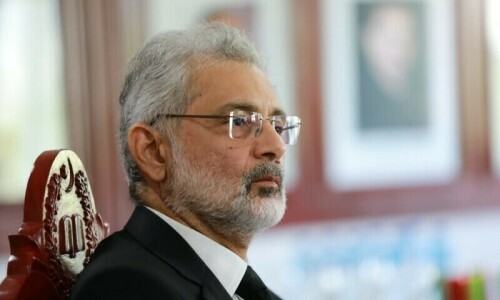ISLAMABAD: Qazi Faez Isa, the Chief Justice of Pakistan (CJP), stated on Monday that press intimidation will not be allowed under any circumstances since it violates important fundamental rights.
He made the statement while giving an order after a drawn-out hearing on media harassment.
Led by the Chief Justice of Pakistan (CJP), a trio of judges comprising Justices Irfan Saadat Khan and Naeem Akhtar Afghan also addressed the Press Association of the Supreme Court’s (PAS) objection to “roving inquiries” launched by the Federal Investigation Agency (FIA) against reporters due to imprecise claims of a “malicious campaign” against the higher judiciary and its justices.
The accusations made by former Rawalpindi commissioner Liaquat Ali Chattha reverberated throughout the hearing.
On February 17, Mr. Chattha has accused the CJP and the Election Commission of Pakistan (ECP) of working together to rig the general elections scheduled for February 8.
The CJP expressed concern during Monday’s hearings that the former commissioner, who later withdrew his statements, had made unsubstantiated claims against him that were carried by all television networks.
The CJP stated that it is standard procedure throughout the world for news stories to be independently confirmed before being broadcast, and that no reporter had questioned the complainant about the evidence he had supporting his allegations.
The CJP regretted, “When the credibility of the institutions is tarnished, we all get affected,” and added that Article 19, which protects the right to free speech, does not grant permission to make unfounded accusations.
Additionally, CJP Isa voiced and denied his grave disapproval of the reports on media harassment provided by the FIA and Islamabad Police.
The court also voiced its dissatisfaction with the police for failing to apprehend the perpetrators of journalist Matiullah Jan’s kidnapping in January 2020. The court pointed fingers at Attorney General of Pakistan (AGP) Mansoor Usman Awan, noting that although the crime was captured on cameras set up as part of the Safe City Project, the police were unable to identify the perpetrators. This is what kind of inspector general? The CJP noted that “he ought to be removed,” noting that it seemed the government was acting as an enabler.
CJP regretted saying, “Shoot one journalist, torture, or pick up another.”
But the AGP promised the court that a thorough report will be filed shortly. Following their assurance to the court that they were prepared to provide all required cooperation in connection with their investigations, police also removed their allegation that media were not participating with the investigation.
On behalf of PAS, senior counsel Salahuddin Ahmed alluded to the FIA’s notifications sent to several journalists for allegedly waging a harmful campaign against judges.
AGP acknowledged that no such complaint had been lodged when the court asked whether these notices had been sent to the journalists based on a report provided by judges or the Supreme Court registrar.
The attorney argued that the information in the false information report (FIR) filed against journalists under sections 9, 10, and 24 of the Prevention of Electronic Crimes Act 2016 (PECA) was merely intended to frighten the media and did not constitute a crime.
The AGP assured the court that he would investigate and provide his advise, stating that he believed sections 9 and 10 of the PECA might not be pertinent to the issue.
Additionally, Mr. Ahmed brought up the JIT that the government had established in accordance with Section 30 of the PECA, in which personnel from intelligence agencies had been co-opted, and he made the point that their presence was prohibited by law. Asad Toor, a journalist who is presently incarcerated, came up during Monday’s sessions. The CJP questioned the justification for the laws that were used to book Mr. Toor.
PBC declaration
In the meantime, the Pakistan Bar Council (PBC) firmly reaffirmed on Monday its unflinching commitment to protecting the judiciary’s independence and guaranteeing freedom of speech in Pakistan.
PBC Executive Committee Chairman Farooq Hamid Naek and Vice Chairman Riazat Ali Sahar stated that these core principles are crucial for maintaining the rule of law and fundamental rights in a dynamic democracy.
Both leaders voiced their worries in a joint statement that professional journalists working within the legal system were being threatened and had obstacles placed in their way of exercising their fundamental rights.
Nobody should be allowed to engage in unethical behavior or make unfounded accusations, especially against distinguished judges of the higher judiciary. This includes members of the media. Judges must be able to carry out their duties in a fair and unbiased manner, without interference or bias, and with strict regard to the law and justice-related values.








